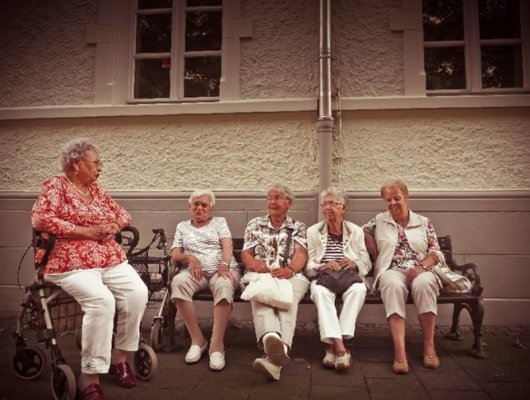
How will these seniors cope in an emergency?
Focus on Senior Citizens
This week I wrote an article for a newspaper being delivered to over a hundred Southern California “55+” mobilehome communities.
The topic was emergency preparedness, and it turned out to be about how seniors struggle to prepare for and to respond to emergencies. The article seems particularly timely given the terrible loss of property and lives in mobile home park disasters across the country in the past couple of years.
The most recent tragedy, of course, was the fire in Paradise, in northern California.
If you have done any research at all about this fire, you will discover that of the 86 people who died in that fire, 53 of them – 77% — were over 65! (If you want to read a full article about that fire and the people who were affected, get this one from the Los Angeles Times.)
The question is:
Why were seniors affected so disproportionately?
We can all probably agree that the basic steps to preparedness are pretty much the same for every audience.
But when you look at these basics, you realize that some proportion of seniors struggle with making any headway.
- Seniors may not have easy access to information about the risks they face.
- They may not have the discipline to come up with a reasonable plan.
- If money is tight, they may not be able to afford the emergency supplies that everyone recommends.
- In a violent emergency (flood, earthquake, fire), seniors may not be strong enough or mobile enough to save themselves. (Just look at the women in the image above.)
But when we look even more closely at why seniors struggle with the concept of preparedness, we see that . . .
Seniors may be a “different breed.”
For example, in my own senior community, when there’s an emergency we immediately hear cries of:
“Who’s going to take care of me?”
Seniors have taken care of others during their lives. Now they expect others to take care of them. The problem with this thinking?
Realities have changed!
- Families no longer live in close proximity.
- Property owners and managers are under no obligation to protect their senior residents.
- We’ve seen how local authorities can be overwhelmed.
- And Federal authorities can be just too late with too little.
Counting on someone else leaves seniors more vulnerable than other groups.
“I’ve made it this far and I’m not changing the way I do things.”
Sound familiar? There are jokes, even movies, about stubborn, crotchety old men.
When it comes to preparedness, though, this is no joke.
- Seniors who refuse to look at risks or to take steps to prepare for them are more likely to become victims.
- Some seniors even actively protest against preparedness announcements – “You are trying to scare me.”
This mindset endangers those people and puts their neighbors at greater risk, too.
“If it’s my time, it’s my time.”
What is there to say to this?!
What can we do to improve this situation? Can you help?
Of course, I have done a lot of searching for different official programs aimed at seniors. But when it comes to conclusions, so many of the reports say that results are, well, inconclusive or downright dismal.
So I’d like to ask YOU to think about the seniors you know, and the ones you’ve worked with, and see if you have suggestions that we could share.
Action item: Please consider the three questions below and include a comment at the bottom of this page or write directly to me at virginia@emergencyplanguide.org.
- When it comes to seniors you know, what attitudes do you encounter toward emergency preparedness?
- What sorts of existing programs or incentives have you seen to be most successful in getting seniors to take an interest in preparing?
- If you ran the world, what would you suggest to improve the odds for seniors facing an emergency?
I’ll be collecting everything I can and will share in later Advisories. (Of course, I’ll maintain confidentiality.)
Thank you.
Virginia
Your Emergency Plan Guide Team
Don't miss a single Advisory.
Thank you for subscribing.
Something went wrong.

Hi Virginia this is my reply.
My partner and I are 76 and 74. We live in a 55+ community. We have easy access to info. because we both use computers every day. Many people in our community don’t have computers and don’t
know how to use them.
My brother is 65 and has never used a computer. He has tried to take computer lessons but because of a medical condition he isn’t able to even find the letter keys.
In a violent emergency I would have to help my partner get into our car and out of the park. Both of us still drive. Some people in this park no longer drive.
What I worry about are the gates to the property. All of the gates are kept locked except the front gate.
If no one opens the other gates how are over 300 people going to get their cars out quickly?
The AED is kept in the locked office. Who will open the office in an emergency to get it? Only a few people know how to use it anyway.
I know that the property managers have a list of people whose addresses will be given to the fire department so that the officers can be sure that those people will be helped to evacuate but when will the fire truck be able to come? Probably not soon!
At the moment we do not have a disaster team!!!
We don’t have answers to these problems.
Mary
Thank you for your detailed comments. I think MOST senior communities face some of these very same challenges. Could the problem of locked gates and a locked-up AED be solved with more people having keys?